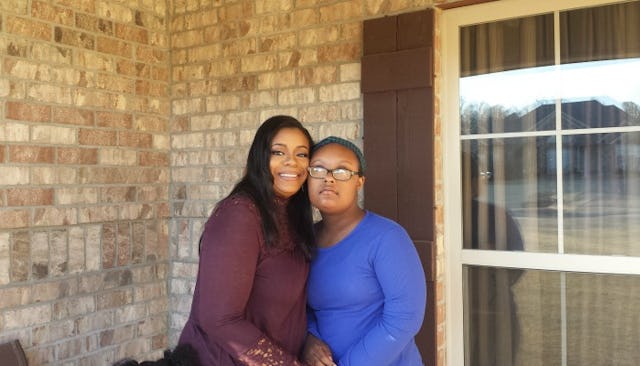6 Steps To Find Peace After Your Child Receives A Life-Changing Diagnosis

Receiving a diagnosis of Down syndrome, or any unexpected diagnosis, can be overwhelming. It’s as if one’s brain must race to catch up to an impeding, befuddled uncertainty. Medical professionals are required to give patients knowledge, or the “reality” if you will. It’s up to the patient to determine what he or she will do with this knowledge.
It took 11 years before I was able to merge “reality” with my “hopes and prayers” to deliver my current level of peace. Here are the six nonlinear steps I took to reach peace with my daughter’s diagnosis:
1. I Cried.
A whole lot. In the many hospitals. At the doctor’s office. After birthday parties. After IEP meetings. I hurt not because of lack of love, but because she was different. I was well aware of how the world treats those who are different.
I thought that the tears were defeatist and showed my weakness as a mother. I didn’t know their healing power. Those tears were a release — a salve to my wounded heart.
2. I Read.
A lot. Anything that I could find related to sign language, hypothyroidism, and Down syndrome. I read any book on sensory integration that I could find. I researched therapies. I even did the dreaded Google medical searches, searching for a cause…even a cure. The more I read, the more I learned that no one could really define my daughter, because every child with Down syndrome is different.
3. I acknowledged my fear.
Deep down, I was very afraid. How could my non-verbal child (now a teen) survive in a world that thrives on verbal communication? Was she angry because she lacked the ability to express herself? How would she ever work? Would she ever be truly independent? So…back to No. 1.
More tears for the conversations we may never have.
I acknowledged my fear with the clause to do something about it. I then…
4. I started writing.
Tucked on a dusty bookshelf are the beginnings of my memoir. I’m an introvert. My home is my sanctuary. I’m not naturally social. Joining a Down syndrome support group was somewhat counterintuitive to me because of my personality.
So I started writing. Writing was my release and my therapy. I was able to express and share my story, so that other parents could have confirmation.
5. I found love.
As cliché as it sounds, it was my happy beginning. I met my husband seven years ago. He represented the epitome of calm and peace as opposed to my somewhat chaotic, unpredictable life. He promised to love my sweet daughter as his own.
And he still does.
And when Nos. 1 and 2 occur, I have his support and advice. Or if there is no advice, I at least have a hug.
6. I let go of guilt.
It’s not my fault — 11 years later, I know. I wanted and prayed for a healthy baby throughout my pregnancy. I received a healthy baby, even though it took us longer to reach health. She may not be complete or perfect by the world’s definition, but to me, she is wonderfully made.
So how can other moms and dads find peace with a medical diagnosis? Here are my humble suggestions:
1. Cry when you must.
Feel what you feel. Let your tears fuel your fire to advocate and fight for your child. And as I said before, I unexpectedly discovered tears have a healing power. Allow yourself a chance to heal.
2. Fight fear with research and exploration.
Ask questions. Don’t accept every answer. Use your intuition. Get a second and third opinion. Then make a plan. And if that plan doesn’t work, create a new one. Every child is different, and no human can predict with 100% certainty any child’s eventual outcome.
3. Discover what motivates you and gives you release.
Take time for you. Find a hobby or something you enjoy doing. Take care of yourself. Laugh, a lot, even when it hurts.
4. Use support.
Find someone who loves your child just as much as you do. It doesn’t have to be a spouse. It can be a friend or trusted neighbor. Even if they can’t “fix” it, at least open up and talk to someone. And if words don’t come, just try a hug. It really is powerful.
5. Avoid negativity.
I mean those people who speak gloom and doom, such as, “How will you make it with a child with special needs?”
Yeah, you know those types. It’s okay to hope and dream. Don’t let them get in the way of that.
6. Throw guilt out the window.
Life is unfair. Things happen outside our control sometimes. The world isn’t perfect. Embrace the here and now and resolve to be guilt-free.
Even if finding peace takes you 11 years, it can happen.
This article was originally published on